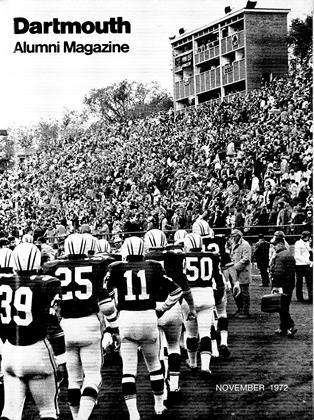Edited by Peter Gay (Durfee Professor of History, Yale University). Han-over: The University Press of New England, 1972. 197 pp. $8.
It was a well kept secret, perhaps unique in the history of presentation volumes by admiring scholars to another scholar, retired, about to be declared superior and venerable. How many hot-leveraged tongues could be frozen into innocent immobility by wives knowing that their husbands would be feted with cocktails, dinner, adulatory speeches, and the presentation of a volume produced by leading academicians, national and foreign? And so the Daniel Webster Professor and Professor of Biography and of Government Emeritus, Arthur M. Wilson, world-famous Diderot expert and author of the recently published $25 biography, praised on both sides of the Atlantic, could walk into a banquet hall, completely unaware of how with handclapping and congratulations he would be presented with a book of ten essays. He did not turn pale but flushed and humorously accused his fellow-worker and wife Mazie of the most refined duplicity.
Several Dartmouth persons had a hand in the production. The frontispiece photograph of Arthur Wilson benevolently reading John Locke and sitting before shelves of books is by Adrian N. Bouchard, College Photographer. The late Jeanne M. Prosser, Assistant Professor of History, and Jacqueline B. Sices, Senior Lecturer in Romance Language and Literature, helped in translations. With sophisticated control, Victor G. F. Reynolds '27, then Director of the University Press of Northern New England, brought all into focus and unity.
In the Preface John Sloan Dickey '29 complimented Mazie Wilson: "A historian in her own right as a student of human foodstuffs, and no less a judge than her husband will gladly testify that as collaborator and companion she truly knows her Diderot—as well as his Diderot." And Mr. Dickey wants known that "The story of Arthur Wilson's well-nigh forty years at Dartmouth is wonderfully reassuring to anyone who is willing to be disabused of the universality of such university 'truths' as that there is something incompatible between being a fine teacher and a first-rate scholar, that committee service is mainly a justification for doing little else well, and perhaps above all that a distinguished academician cannot afford to be too much attached to an institution lest he be too little attached to his discipline."
The most delightful essay is "Johnson and Foreign Visitors to London: Baretti and Others" by James L. Clifford (Columbia University). Baretti: "Johnson was a real true-born Englishman. He hated the Scotch, the French, the Dutch, the Hanoverians, and had the greatest contempt for all other European nations." Not well known is the meeting of Johnson and Casanova (of all persons!) in (of all places!) the British Museum where the long Latin conversation centered on the origin of the French word comite (committee). Tacitly Mr. Clifford asks: "Who was spoofing whom?"
The other nine contributing scholars are: Baxter (University of North Carolina), Hanna (Université de Montréal), Desné (Université de Reims), Gay (Yale University), Kuhns (Columbia University), Proust (Université de Montpellier), Casini (Instituto de Filosofia della Università di Roma), Mortier (Université Libre de Bruxelles), and Knapton (Wheaton College).
One regrets the absence of articles from a Russian and a Spaniard, for in Russia and Spain the indefatigable and cosmopolitan pursuer of Diderot found incongruousness and contradictions. As raconteur he is likely to upset any gastronomically minded dinner hostess, for, combined and concentrated, Diderot-Wilson causes all guests, open-mouthed, to forget to eat, so delicious are anecdotes spiced with paradox and wit.
 View Full Issue
View Full Issue
More From This Issue
-
 Feature
FeatureFour Views of Educational Opportunity at Convocation Opening the 203rd Year
November 1972 -
 Feature
Feature1972 ANNUAL REPORT
November 1972 -
 Feature
FeatureElection '72: A Historian's View
November 1972 By JAMES E. WRIGHT -
 Feature
Feature"A Greater Feminine Presence"
November 1972 -
 Article
ArticleBig Green Teams
November 1972 -
 Article
ArticleFaculty
November 1972
JOHN HURD '21
-
 Article
Article"Janssen Plan for Peace"
OCTOBER 1958 By JOHN HURD '21 -
 Books
BooksAMAZING BUT TRUE ANIMALS.
JANUARY 1964 By JOHN HURD '21 -
 Books
BooksUNDER THE ROCK, POEMS FROM A VALLEY.
JANUARY 1968 By JOHN HURD '21 -
 Feature
FeatureThe Woes of the Hoit Brothers
November 1968 By John Hurd '21 -
 Books
BooksALL THE BEST IN AUSTRIA WITH MUNICH AND THE BA VARIAN ALPS.
APRIL 1972 By JOHN HURD '21 -
 Books
BooksOHIO AN ARCHITECTURAL PORTRAIT
October 1973 By JOHN HURD '21
Books
-
 Books
BooksMR. MADISON'S WAR
January 1937 By Allen R. Foley '20 -
 Books
BooksAdding to the Mosaic
SEPTEMBER 1982 By David Shribman '76 -
 Books
Books"Portraits of a Half Century"
January, 1926 By Edwin J. Bartlett -
 Books
BooksALUMNI PUBLICATIONS
February 1920 By F.P.E., C.E.B. -
 Books
BooksTHE DARTMOUTH BOOK OF WINTER SPORTS
January 1940 By Nathaniel L. Goodrich -
 Books
BooksHEAD AND NECK INJURIES IN FOOTBALL: MECHANISMS. TREATMENT, AND PREVENTION.
April 1974 By THOMAS E. CLARKE '66


